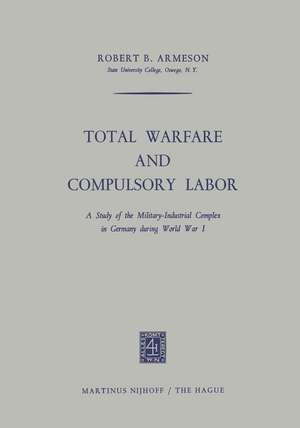Total Warfare and Compulsory Labor: A Study of the Military-Industrial Complex in Germany during World War I
Autor Robert B. Armesonen Limba Engleză Paperback – 1964
Preț: 382.18 lei
Nou
Puncte Express: 573
Preț estimativ în valută:
73.14€ • 75.89$ • 61.13£
73.14€ • 75.89$ • 61.13£
Carte tipărită la comandă
Livrare economică 17-31 martie
Preluare comenzi: 021 569.72.76
Specificații
ISBN-13: 9789401504348
ISBN-10: 9401504342
Pagini: 168
Ilustrații: 155 p. 2 illus.
Dimensiuni: 170 x 244 x 9 mm
Greutate: 0.28 kg
Ediția:1964
Editura: SPRINGER NETHERLANDS
Colecția Springer
Locul publicării:Dordrecht, Netherlands
ISBN-10: 9401504342
Pagini: 168
Ilustrații: 155 p. 2 illus.
Dimensiuni: 170 x 244 x 9 mm
Greutate: 0.28 kg
Ediția:1964
Editura: SPRINGER NETHERLANDS
Colecția Springer
Locul publicării:Dordrecht, Netherlands
Public țintă
ResearchCuprins
I. Unforeseen Warfare.- Germany on the eve of 1914, The expected warfare. Barbed wire, trenches, and machine-guns. Industrialists versus traditionalist-minded generals. The battles of material. The military crisis of mid-.- II. Political Generals and Industrial Magnates.- Emergence of the political generals. Rude awakening: the Cambrai war council. Agrarians, industrialists, and the new Supreme Command. The military-industrialist alliance. Victory and the labor problem. Total warfare and compulsory labor. Forced labor from the occupied territories. Momentous decisions: the necessity for total warfare.- III. Opposition to Total Warfare.- Dangers inherent in the effort to militarize the entire life of the nation. Voluntary versus forced labor. Forced labor commences in the occupied territories. Deportations and international law. The Kingdom of Poland: political objections and military necessity. National Service: final solution to the labor problem.- IV. Emergence of the Concept of National Service.- General Groener and the War Office. National Service: the embodiment of total warfare. National Service: an expression of national unity. Labor’s fears and Groener’s promises. The government’s draft of the bill for National Service. Signs of discontent.- V. The Fragile Burgfrieden.- The government’s position: the necessity for mobilizing labor. Misgivings of the middle-class political parties. Socialist opposition. The ending of the Burgfrieden. Labor’s powerful bargaining position.- VI. Formation of the Future Weimar Coalition.- Military necessity versus political and social safeguards. The alliance of Majority Socialists, Center, and Progressive Parties. Public opinion and National Service: Dienstpflichtor patriotic socialism?.- VII. Consequences of NationalService.- Unrestricted submarine warfare. National Service in operation. Groener, labor, and management. Social, economic, and constitutional effects of National Service.- VIII. Crisis, Reform, and National Service.- Social and economic unrest. Democracy and reaction. The July Crisis. The fall of Groener. Aftermath.- Epilogue.











